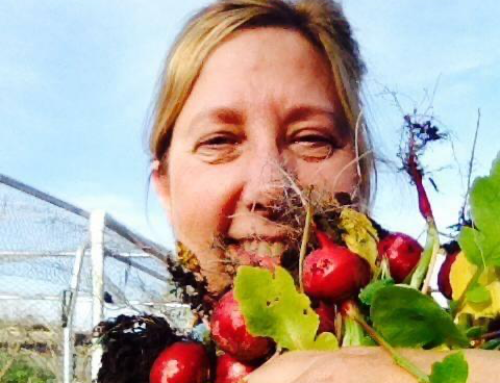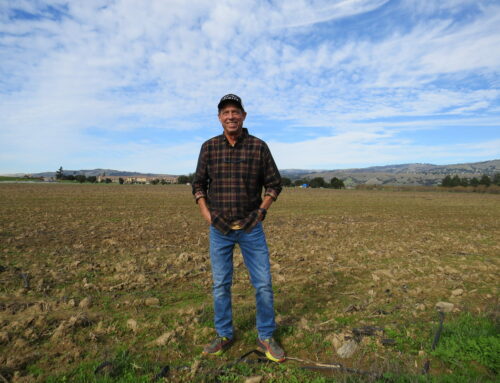Program is run through the University of California education system
Published in the February 4-17, 2015 issue of Morgan Hill Life
By Staff Report

Photo by Marty Cheek
Master Gardener Kathy Knapp teaches about 50 people attending a recent class how to prune a tree.
Morgan Hill resident Kathy Knapp discovered the Master Gardeners of Santa Clara County program when she was “going crazy” trying to figure out how to get rid of aphids in her garden. Someone told to call the nonprofit group’s hotline and she was helped by a friendly gardener with advice.
After that, she was hooked. She applied and was accepted into the program run through the University of California education system. Like many other residents in Morgan Hill, gardening is Knapp’s passion and she believes that, “To plant a seed and watch it grow makes life just a bit better.”
We asked Knapp about the Master Gardeners program and why she might encourage other people with a passion for gardening to get involve.
Describe the Master Gardeners of Santa Clara County and what the group does to help people learn gardening skills.
I love this question. Many do not know we are an extension of the University of California and our goal is to advise, educate and help the home gardener. There are Master Gardeners programs in all 50 states as well as Canada. We are all volunteers that live in Santa Clara County so we know first-hand our climate, plants, trees and soil. So when you have questions, we have answers. We have a free hotline that helps solve any gardening question, lots of library talks and community outreach of all types. You can even find helpful tips on Facebook.
The Master Gardeners puts on free workshops at the Morgan Hill Library. Why does it do this and what are the benefits?
Since our mission is to adapt and extend research-based horticultural information to the public, the library is a great venue. It is in the heart of our community and allows us to give gardening presentations to the public at no charge. We give a variety of different talks from beginning gardening, to growing fruit trees and vegetables, drought tolerant landscaping and many others. Local conditions and pest problems are addressed with several possible solutions so people have information in which to solve problems and hopefully get a bountiful harvest as a result.
Gardening is an excellent learning experience for children. How might you encourage families to start their own home garden and help young people discover where food and flowers come from?
We believe that the garden is an outside classroom full of wonders just waiting to be explored. There’s no better place to begin than at home and school. At all our community events, we have a children’s table. The kids can pot up a seed, learn all about beneficial flower and insects and take home vegetables to grow and share. We also assist any school garden that calls us. To watch the excitement on the students’ faces when they harvest what they planted is magic. This magic will last a lifetime.
How might you encourage people to develop water-wise gardens during the drought?
We encourage people to develop water-wise gardens by showing them how many colorful, beautiful, artistic plants are also drought tolerant. People are often not aware how many great choices are available. We also show them how much water and money can be saved by converting to a drought-tolerant landscape. Many of these plants provide other benefits such as attracting pollinators, beneficial insects, and birds to the garden. We also show people how to conserve water by using mulch, compost, and the correct irrigation system.
Although it’s winter, people need to start getting their gardens ready for spring. What are some tips they might need to know to have a beautiful garden?
All healthy gardens begin with healthy soil. Soil is the key. To give your soil a boost, growing a cover crop can help replenish the soil of needed nutrients, such as nitrogen. Add compost. You can make it yourself. Morgan Hill offers two workshops a year on how to turn your yard and kitchen scraps into rich compost. Also, Starbuck’s will give you their coffee grounds, which help acidify our naturally basic soil, as well as adding in some nitrogen.




